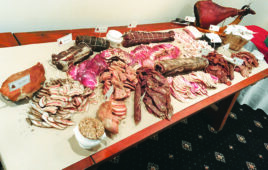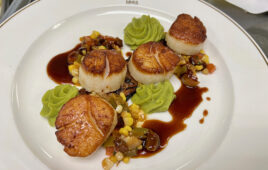
“There are certain things you simply can’t learn or do in other parts of the culinary world,” says CCD’s Brian Beland (left). “The honeybee program has helped us to differentiate ourselves and attract top talent.”
Active honey bee colonies at these two clubs are yielding sweet rewards.
The dedication shown by the Town & Country Club (T&CC) to sustainability is indisputable. The Saint Paul, Minn., club has had vegetable gardens on its property for over a decade. The course has been a Certified Audubon Cooperative Sanctuary since 1998. And in 2013, T&CC became the first country club in the United States to have both its clubhouse and pool house earn Certified Green Restaurant® designations (“Don’t Get Mad…Get Green,” C&RB, June 2013).
But for years, Town & Country’s General Manager/COO, Vincent Tracy, CCM, CCE, wanted to take the club’s efforts a step further by hosting a honey bee colony on property, too.
“I came across a hive-to-bottle program through the Bee Squad at the University of Minnesota [UMN] in Minneapolis,” says Tracy. “It seemed like a great option for us.”
The UMN Bee Squad is exactly what it sounds like: a committed group of researchers dedicated to bringing back a bee-friendly world by educating, training, and assisting people engaged in helping bees thrive.
“Our members are more aware of bees and how we can live in better harmony,” says Vincent Tracy, General Manager/COO of T&CC .
“The Bee Squad acts as the beekeeper for colonies owned by families or organizations, like T&CC,” says Becky Masterman, Ph.D., Associate Program Director of the UMN Bee Squad. “We manage the honey bee colonies and harvest any surplus honey for their owners at the end of the season.”
T&CC has three colonies, managed by the Bee Squad, that live on top of its course maintenance center. The goal is to eventually have six.
“T&CC’s careful management of their grounds and the environment makes the location ideal for honey bee colonies,” says Masterman.
Last year, the hives yielded about 120 pounds of honey for the club. The previous year, it was closer to 80. And while the club doesn’t have a signature honey dish yet, it does have an annual bee-centric event that generates a lot of “buzz” within the membership.
“Dr. Marla Spivak [MacArthur Fellow and Distinguished McKnight Professor in Entomology at UMN] currently runs the UMN Bee Lab,” says Tracy. “She also does TED talks across the country and is widely known as the leading expert on bees.
“She lives down the street from the club,” Tracy continues, “and every year we do a member event called the Bee Meet, where she comes with the Squad to do a presentation.”
Afterward, the club hosts a buffet for the 100 or so members in attendance. The menu, of course, features honey-focused dishes and sweets.
“We use our honey in a number of ways, in dressings, sauces and desserts,” says John Kain, T&CC’s Executive Chef. “It gives us major bragging rights, because it’s such a unique product.”
In the three years T&CC has hosted the hives, the club grounds have become even more bee-friendly, too, with bee-specific flowers. Members can also purchase eight ounces of T&CC honey for $8, Tracy says.
Nearly 700 miles east of Saint Paul, the Country Club of Detroit (CCD), Gross Pointe, Mich., recently launched its own honey bee program by contracting with Beekeeper Francois Faloppa, who is licensed and insured (important selling points for both CCD management and members when Brian Beland, CMC, CCD’s Executive Chef and Director of Food and Beverage, was pitching the program). The club leases the hives through Faloppa, who does all of the maintenance and honey collection, with the help of the CCD staff.
The total cost for setting up CCD’s three hives was $2,500. The club gets to keep all of the honey and wax, and Faloppa also offers three classes for members, plus a kids camp. He is also responsible for weekly or biweekly hive inspections, as well as continued maintenance and winterization.
“We’re fortunate to have land that allows us to move forward with fun activities that keep our cooks, grounds crew and members involved in educational and environmentally sound practices,” says Beland. “With larger vegetable plots coming online next summer, we can build on this program, which adds to the overall member experience.” The programs also help CCD recruit up-and-coming cooks and differentiate itself from its competition.




